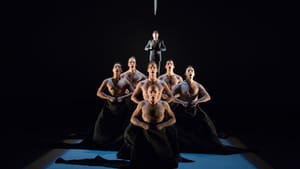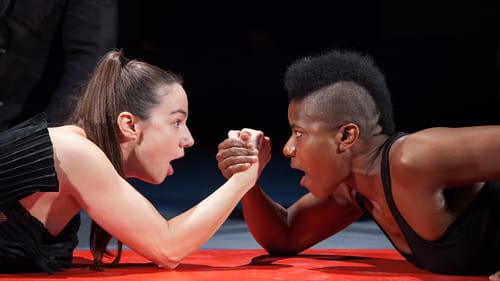Stay in the Loop
BSR publishes on a weekly schedule, with an email newsletter every Wednesday and Thursday morning. There’s no paywall, and subscribing is always free.
What was before the beginning
Attis Theatre's 'Antigone' at the Wilma (first review)

As the audience files in to see the Greek-based Attis Theatre’s production of Antigone, a man at the rear of the stage, a meat cleaver suspended above his head, is mumbling a furious recitation to himself. Nothing of what he says can be deciphered, if indeed it is articulate speech at all; what we see is merely the physical act of self-expression. Perhaps we should assume that this was the immemorial beginning of storytelling itself, the impulse to organize experience even without the means to do so. Perhaps we should understand it as the narrative that has neither beginning nor end, and so is essentially a babble whether it has words or not.
Greek drama stands near the headwaters of our Western narrative tradition; only Homer, Herodotus, and the Bible precede it. It grew out of cultic ritual, and one of its earliest examples, Sophocles’s Antigone, is about the necessity of ritual, and the terrible consequences of failing to observe it. The play, as written, is a taut dramatic text, but the long shadow of its subject falls over it.
Modern productions often emphasize its political or feminist implications; that is, its relevance to our own time and concerns. But it is just as valid, and for us arguably more enlightening, to emphasize its primitive, ritual aspects — to present it, in fact, as ritual. That is the premise behind the Attis Theatre presentation, and the vision of its founder and artistic director, Theodoros Terzopoulos, whose production of Ajax had such an extraordinary impact two years ago at the Wilma.
The story is briefly told: Eteocles and Polynices, the sons of King Oedipus, share his rule after his departure, but each, bidding for supreme power, kills the other in battle. Their uncle, Creon, arbitrarily decides to give Eteocles a hero’s funeral but leaves Polynices unburied. Their sister, Antigone, defies Creon’s edict and herself attempts to bury Polynices in accordance with divine law. Her punishment and suicide trigger a universal disaster that destroys the royal house.
No suspense
Greek tragedy is a theater without mystery in that its outcome is known beforehand. Even without knowing the ancient myths on which its stories are based, as Greek audiences of the time would have, the modern spectator can sense where such a play will go from the beginning. In the world of realistic drama — our world — it is at least conceivable that Antigone can persuade Creon to rescind his edict and honor divine command, or, conversely, that Creon will bully Antigone into submission; on the tragic stage, it is implicit from the beginning that no character will deviate from the ground he or she has staked out, and that the speeches thus reflect a preordained course of action. This is precisely what occurs in ritual, where each celebrant or mourner has one and only one thing to do.
In staging the play as ritual, Terzopoulos pares the text and lets stylized physical action, a choreography without dance, serve to express its essential gestures. Speech is further replaced by the disciplined suspiration and wordless vocalization of a six-man chorus whose members are occasionally detached to perform character roles. Modern productions characteristically trim the extensive choral texts of Greek tragedy; by eliminating virtually all speech from the chorus, Terzopoulos is able to restore its most primitive expressive power.
This may, indeed, be the most extraordinary aspect of the current production, for the kind of vocal training, physical discipline, and balletic coordination required of such a chorus is usually the work of years, and yet a largely local cast was able to master it to striking effect within weeks. Principal characters, too, are stylized if more carefully individuated in their movements, and the ensemble as a whole creates an effect in which every motion and gesture is impregnated with meaning and power. The pedigree of this approach in Jerzy Grotowski’s Poor Theater of the 1960s is evident, but Terzopoulos’s style is all his own, and with splendidly integrated scenic and lighting design (also his own), he produces image after image of great formal beauty as the tragic ritual unfolds.
Unmoored from time
Since ritual itself is timeless (however particular forms of it may change), the costuming — again by Terzopoulos — reflects a variety of styles, and also, in the case of the chorus, a very expressive partial nudity. The subtle score of Panayiotis Velianitis underlines the action, but at one point offers a startlingly contemporary twist when Jennifer Kidwell, who plays Antigone, feelingly sings George Gershwin’s “Summertime.” Porgy and Bess with Antigone? But it was an effective stroke, humanizing Ms. Kidwell’s otherwise severe performance as the ritual priestess who demands that the rites of burial be carried out regardless of the consequences to herself. The song became every human happiness Antigone forswears in offering herself as the sacrificial substitute on the altar of duty. She cannot save the royal family that must perish with her, but she does, arguably, save the city from pollution and the divine wrath that will attend it.

Kidwell is a strong presence, and her powerful build, set off by a tank-top costume, is in contrast to her weaker, more traditionally garbed sister Ismene (Sarah Gliko). The other performers are all good and sometimes startlingly impressive in their contortions — Antonis Miriagos’s Creon, Stathis Grapsas’s and Ross Beschler’s Teiresias, Brian Ratcliffe’s Haemon, Paolo Musio’s Chorus Leader, Steven Rishard’s Messenger, Ed Swidey’s Narrator — but what counts in such a production are the ensemble values, the way each performance is integrated into the seamless whole. Terzopoulos’s success in achieving this is the triumph of the production.
It’s not often American audiences can experience the concentrated power of this kind of theater, which vitally restores to its earliest classics a sense of the force they must have had for their original audiences, while opening them, too, for our own secular, desacralized world. Perhaps, as it suggests, we too ignore the "gods" at our peril.
For Richard da Silva's review, click here.
What, When, Where
Antigone by Sophocles. Translated by Marianne McDonald; Theodoros Terzopoulos directed. Through November 8, 2015 at the Wilma Theater, Broad and Spruce Streets, Philadelphia. 215-546-7824 or wilmatheater.org.
Sign up for our newsletter
All of the week's new articles, all in one place. Sign up for the free weekly BSR newsletters, and don't miss a conversation.

 Robert Zaller
Robert Zaller